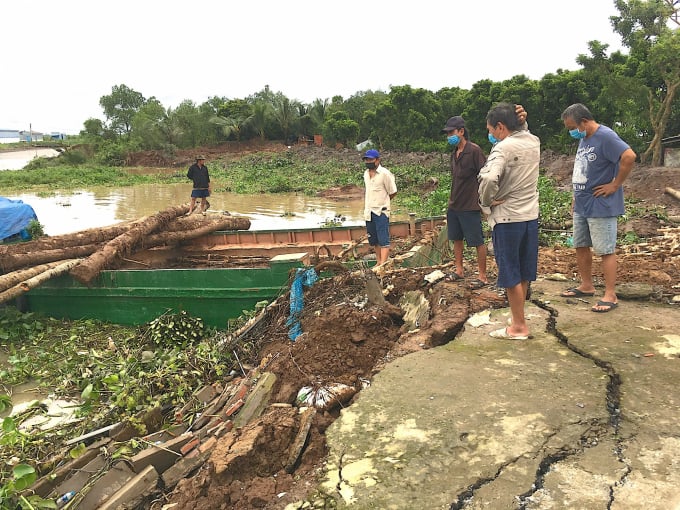December 8, 2025 | 16:17 GMT +7
December 8, 2025 | 16:17 GMT +7
Hotline: 0913.378.918
December 8, 2025 | 16:17 GMT +7
Hotline: 0913.378.918
Recently, Vietnam Disaster Management Authority and the Mekong Delta Climate Resilience Program (MCRP) together with the German Society for International Cooperation (GIZ) organized a webinar to initiate MCRP phase 2.
The webinar aimed to update the results of MCRP phase 1, introduce and consult the People's Committees, Departments of Agriculture and Rural Development, Departments of Construction, Departments of Planning and Investment, Departments of Natural Resources and Environment of thirteen provinces and cities in the Mekong Delta on organizing the implementation of phase 2.

A landslide at Co Chien river. Photo: Minh Dam.
MCRP is a development cooperation program funded by the Governments of Germany, Switzerland and Vietnam. The program is authorized by the German Federal Ministry of Economic Cooperation and Development (BMZ) and Switzerland’s Economic Cooperation and Development (SECO), jointly implemented by the German Society for International Cooperation (GIZ) and the Disaster Management Authority (Vietnam Ministry of Agriculture and Rural Development).
According to the report of the MCRP representative, implemented from 2019 to 2021, the first phase of the program has established an important institutional framework for regional coordination. At the same time, necessary investment plans have been made to strengthen Mekong Delta’s resilience to climate change.
In addition, the program contributes to the development of sets of criteria to evaluate the quality of provincial, regional and national planning. MCRP also gave out advice to the Mekong Delta provinces in the process of provincial planning, develop strategies to improve capability, taking gender equality into account so that the implementation can be carried out effectively.

Ladle to reinforce the embankment. Photo: Minh Dam.
The Vietnam Disaster Management Authority presented the draft for MCRP phase 2 at the webinar. The program is expected to be implemented from 2022 to 2025. This phase’s goal is to improve the management of land, water and mangrove in the coastal Mekong Delta.
The MCRP phase 2 will focus its support on three main areas: Institution - policy, planning for investment and technology application, and urban drainage - anti-flood. The project consists of 4 components:
The first is to establish an institutional framework to promote Mekong Delta’s development links in adaptation to climate change.
The second is to improve regional planning and investment for urban and rural water management to adapt to climate change, taking gender equality into account.
The third is to apply new and innovative technological solutions to prevent coastal erosion and landslide, thereby strengthening the ability to adapt to climate change for rural infrastructure and ecosystem.
The fourth is to construct urban drainage and anti-flood infrastructure in a sustainable way, adaptive to climate change.
The Disaster Management Authority will be the focal point and the project owner to receive the contribution of Mekong Delta provinces and cities to complete the program to serve as a report to the Ministry of Agriculture and Rural Development, which the MARD will later submit the Government for approval.
The total investment budget for MCRP phase 2 is expected to be at 12.8 million euros (roughly VND 350 billion). In which, non-refundable ODA aid is 11.35 million euros, including 5.05 million euros from BMZ and 6.3 million euros from SECO. Vietnam will reciprocate from the budget capital with 10% of the aid capital, equivalent to about 1.1 million euros.
Translated by Samuel Pham
/2025/12/01/2936-2-222331_70.jpg)
(VAN) Mortgaging his house and giving up a pharmaceutical management career, Mr. Nguyen Quang Duy succeeded in bringing Khanh Hoa's sea grapes to demanding markets such as Japan and the U.S.

(VAN) The large-scale agroforestry investment project aims to develop a leading sustainable agro-industrial center in Angola.
/2025/11/28/3433-1-212821_213.jpg)
(VAN) Many localities across the coconut land of Vinh Long are replicating emission-reducing models in production and daily life, contributing to the targets for emission reduction and green economic development.

(VAN) The green transition is an inevitable path for collective economy to achieve balanced growth and align with global trends.

(VAN) The TH Group is not only Vietnam’s leading clean-milk producer; it is also leaving a strong mark on sustainable development as it pursues the goal of carbon neutrality.
/2025/11/27/3830-1-152901_403.jpg)
(VAN) Dong Nai is developing its key crop areas, expanding planting area codes, and applying high technology to increase the value of agricultural products, aiming at a green and sustainable agriculture.

(VAN) Tay Ninh’s livestock sector is undergoing a major transformation, applying high-tech, closed-loop circular models to build sustainable value chains.